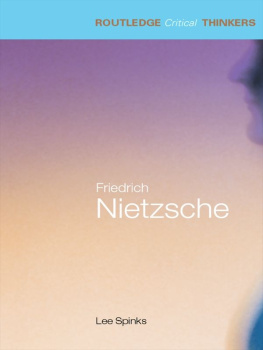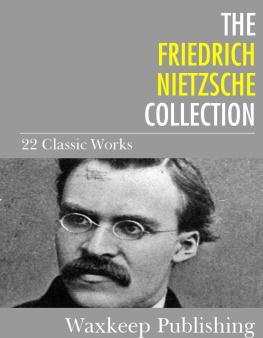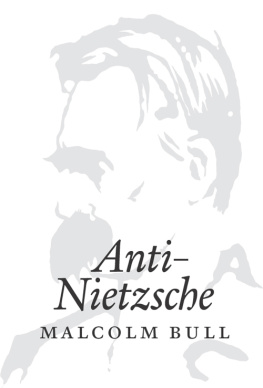
TWILIGHT OF THE IDOLS
and
THE ANTI-CHRIST
FRIEDRICH NIETZSCHE was born near Leipzig in 1844, the son of a Lutheran clergyman. He attended the famous Pforta School, then went to university at Bonn and at Leipzig, where he studied philology and read Schopenhauer. When he was only twenty-four he was appointed to the chair of classical philology at Basle University; he stayed there until his health forced him into retirement in 1879. While at Basle he made and broke his friendship with Wagner, participated as an ambulance orderly in the Franco-Prussian War, and published The Birth of Tragedy (1872), Untimely Meditations (18736) and the first part of Human, All Too Human (1878; two supplements entitled Assorted Opinions and Maxims and The Wanderer and his Shadow followed in 1879 and 1880 respectively). From 1880 until his final collapse in 1889, except for brief interludes, he divorced himself from everyday life and, supported by his university pension, he lived mainly in France, Italy and Switzerland. The Dawn appeared in 1881 followed by The Gay Science in the autumn of 1882. Thus Spoke Zarathustra was written between 1883 and 1885, and his last completed books were Ecce Homo, an autobiography, and Nietzsche contra Wagner. He became insane in 1889 and remained in a condition of mental and physical paralysis until his death in 1900.
MICHAEL TANNER was educated in the RAF and at Cambridge University, where he was a Lecturer in Philosophy until 1997 and is a Fellow of Corpus Christi College. He is equally interested in philosophy, music and literature, his particular areas being Friedrich Nietzsche and Richard Wagner. He has written for many journals, contributed The Total Work of Art to The Wagner Companion, and is the author of Nietzsche (1995) and Wagner (1996).
R. J. HOLLINGDALE translated eleven of Nietzsches books and published two books about him; he also translated works by, among others, Schopenhauer, Goethe, E. T. A. Hoffman, Lichtenberg and Theodor Fontane, many of these for Penguin Classics. He was the honorary president of the British Nietzsche Society. R. J. Hollingdale died on 28 September 2001. In its obituary The Times described him as Britains foremost postwar Nietzsche specialist and the Guardian paid tribute to his inspired gift for German translation. Richard Gott wrote that he brought fresh generations through fluent and intelligent translation to read and relish Nietzsches inestimable thought.
FRIEDRICH NIETZSCHE
TWILIGHT OF THE IDOLS
AND
THE ANTI-CHRIST
TRANSLATED BY
R. J. HOLLINGDALE
INTRODUCTION BY
MICHAEL TANNER
PENGUIN BOOKS
PENGUIN BOOKS
Published by the Penguin Group
Penguin Books Ltd, 80 Strand, London WC2R 0RL, England
Penguin Putnam Inc., 375 Hudson Street, New York, New York 10014, USA
Penguin Books Australia Ltd, 250 Camberwell Road, Camberwell, Victoria 3124, Australia
Penguin Books Canada Ltd, 10 Alcorn Avenue, Toronto, Ontario, Canada M4V 3B2
Penguin Books India (P) Ltd, 11 Community Centre, Panchsheel Park, New Delhi 110 017, India
Penguin Books (NZ) Ltd, Cnr Rosedale and Airborne Roads, Albany, Auckland, New Zealand
Penguin Books (South Africa) (Pty) Ltd, 24 Sturdee Avenue, Rosebank 2196, South Africa
Penguin Books Ltd, Registered Offices: 80 Strand, London WC2R 0RL, England
www.penguin.com
Gtzen-Dmmerung first published 1889
Der Antichrist first published 1895
This translation published 1968
This edition with a new Introduction published 1990
Reprinted with a new Chronology and new Further Reading 2003
30
Translation and Translators Note copyright R. J. Hollingdale, 1968
Introduction copyright Michael Tanner, 1990
All rights reserved
Except in the United States of America, this book is sold subject
to the condition that it shall not, by way of trade or otherwise, be lent,
re-sold, hired out, or otherwise circulated without the publishers
prior consent in any form of binding or cover other than that in
which it is published and without a similar condition including this
condition being imposed on the subsequent purchaser
EISBN: 9780141904290
Contents
Introduction to
TWILIGHT OF THE IDOLS
and
THE ANTI-CHRIST
Both these two brief, marvellous books were written during the latter half of 1888, the last year of Friedrich Nietzsches sane life. In Ecce Homo, the highly eccentric autobiography which he immediately went on to write after The Anti-Christ, Nietzsche remarks at the end of the short chapter he devotes to Twilight, I have never experienced such an autumn, nor have I thought anything of the sort possible on earth a Claude Lorraine thought on to infinity, every day of the same excessive perfection. In the epigraph to Ecce Homo, which he wrote himself, the note he strikes is still more elegiac:
On this perfect day, when everything has become ripe and not only the grapes are growing brown, a ray of sunlight has fallen on to my life The first book of the Revaluation of all Values [by which Nietzsche means The Anti-Christ], the Songs of Zarathustra my attempt to philosophize with a hammer [an allusion to the subtitle of Twilight] all of them gifts of this year, of its last quarter even! How should I not be grateful to my whole life?
To move from those expressions of gratitude to the two prose works they refer to comes as a shock. For the tone of both Twilight and The Anti-Christ is predominantly strident, even shrill, and many commentators, not just unsympathetic ones, have registered distress at what strikes them as a self-betraying crudity and oversimplification of the profound and somewhat more calmly expressed insights to be found in his preceding books, especially in On the Genealogy of Morals written only the previous year. Nietzsches self-apotheosis in Ecce Homo and his collapse into insanity at the very beginning of 1889 are taken by these regretful readers as sad confirmations of the deterioration discernible in these two soi-distant autumnal products. Yet if one recognizes the irony of Ecce Homo and if one didnt know of Nietzsches impending madness, the difference of tone between these two books and what preceded them might well not seem so great, and the incredible richness of content which both of them possess might be more apparent.
It would be grotesque, of course, to deny that these books are, to put it at its gentlest, eccentric. The arch Yes-sayer seems to be on remarkably negative form, as both titles suggest. He even seems to be unclear on this matter himself. In number 6 of the section of Twilight entitled What the Germans Lack he says, To be true to my nature, which is affirmative and has dealings with contradiction and criticism only indirectly and when compelled, while in number 1 of the last section, What I Owe to the Ancients, he writes, rather more convincingly until the last clause, My taste, which may be called the opposite of a tolerant taste, is far from uttering a wholesale Yes: in general it dislikes saying Yes, it would rather say No, most of all it prefers to say nothing at all, and in the Foreword he claims that This little book is a grand declaration of war, having just written to confuse the issue still further that This book is above all a relaxation, a sunspot, an escapade into the idle hours of a psychologist. It would perhaps be tactless, and giving hostages to fortune, to press Nietzsche too hard about this; but it is strange that a book which claims to demolish Not merely eternal idols, also the youngest of all (his characterization of it in
Next page

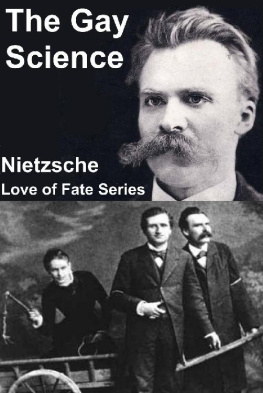
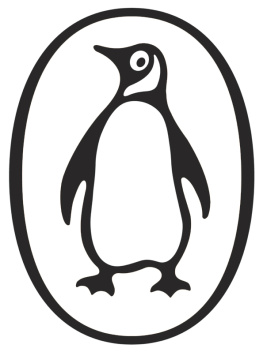
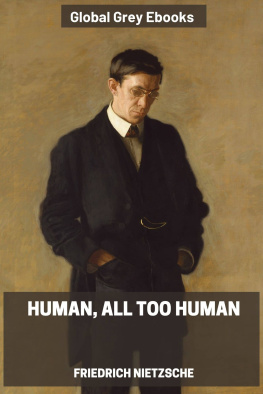
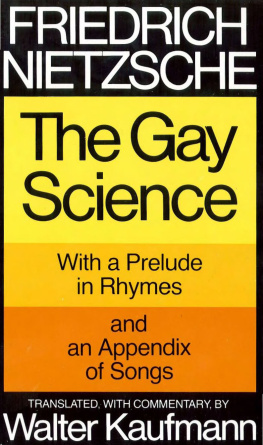
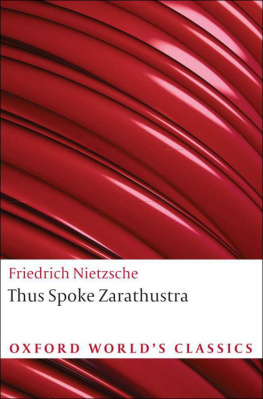
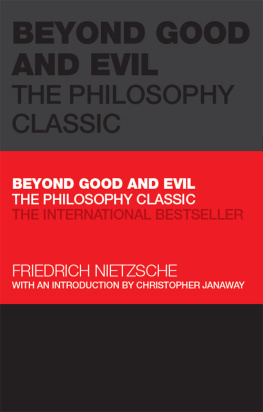
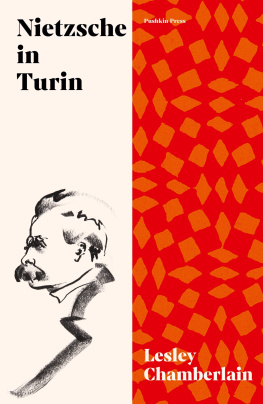
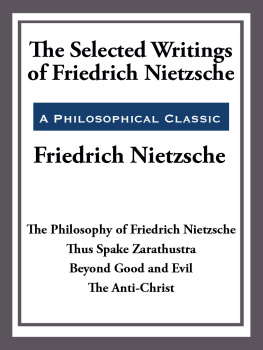
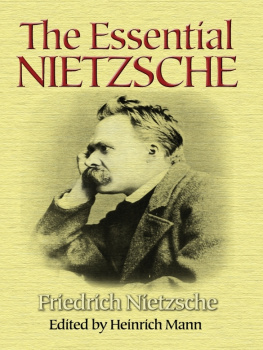
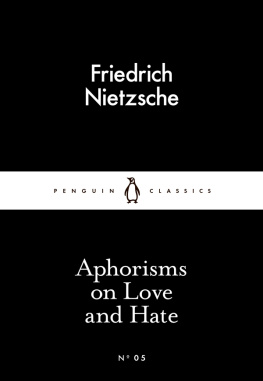
![Nietzsche - Twilight of the Idols [N.F. - Philosophy]](/uploads/posts/book/249935/thumbs/nietzsche-twilight-of-the-idols-n-f.jpg)

